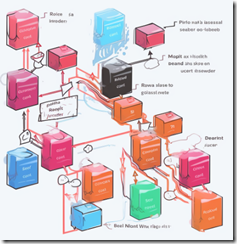Shall We Train Smart Software on Scientific Papers? That Is an Outstanding Idea!
May 29, 2023
 Note: This essay is the work of a real and still-alive dinobaby. No smart software involved, just a dumb humanoid.
Note: This essay is the work of a real and still-alive dinobaby. No smart software involved, just a dumb humanoid.
I read “Fake Scientific Papers Are Alarmingly Common. But New Tools Show Promise in Tackling Growing Symptom of Academia’s Publish or Perish Culture.” New tools sounds great. Navigate to the cited document to get the “real” information.
MidJourney’s representation of a smart software system ingesting garbage and outputting garbage.
My purpose in mentioning this article is to ask a question:
In the last five years how many made up, distorted, or baloney filled journal articles have been produced?
The next question is,
How many of these sci-fi confections of scholarly research have been identified and discarded by the top smart software outfits like Facebook, Google, OpenAI, et al?
Let’s assume that 25 percent of the journal content is fakery.
A question I have is:
How does faked information impact the outputs of the smart software systems?
I can anticipate some answers; for example, “Well, there are a lot of papers so the flawed papers will represent a small portion of the intake data. The law of large numbers or some statistical jibber jabber will try to explain away erroneous information. Remember. Bad information is part of the human landscape. Does this mean smart software is a mirror of errors?
Do smart software outfits remove flawed information? If the peer review process cannot, what methods are the smart outfits using. Perhaps these companies should decide what’s correct and what’s incorrect? That sounds like a Googley-type idea, doesn’t it?
And finally, the third question about the impact of bad information on smart software “outputs” has an answer. No, it is not marketing jargon or a recycling of Google’s seven wonders of the AI world.
The answer, in my opinion, is garbage in and garbage out.
But you knew that, right?
Stephen E Arnold, Mary 29, 2023



